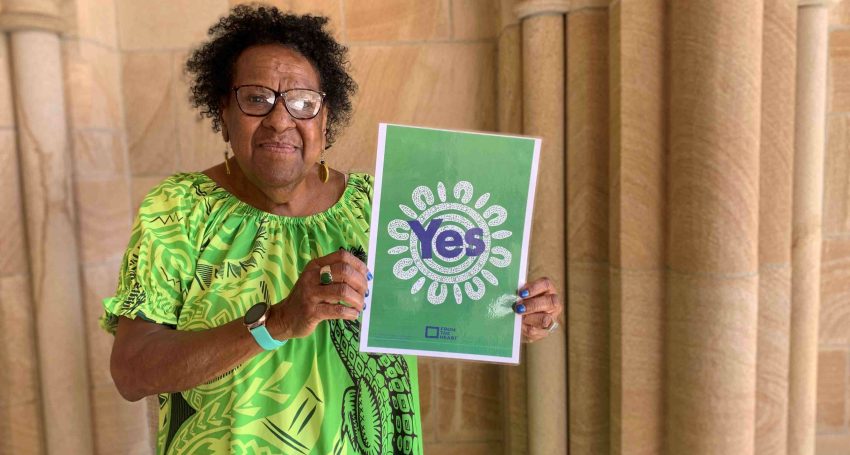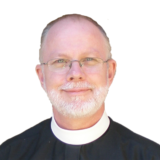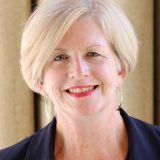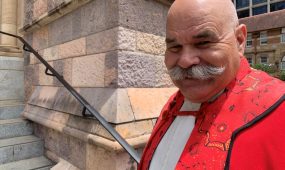ACSQ Parliamentary submission: 'Blessed are the peacemakers, for they will be called children of God'
Justice & Advocacy
“As Christians, we place a high value on peace. The Bible records Jesus of Nazareth saying: ‘Blessed are the peacemakers, for they will be called children of God’…We believe that the implementation of the Voice through the proposed constitutional amendment wording will advance peace and the ongoing Reconciliation process, thus helping to foster healing and unify our country,” say Aunty Dr Rose Elu, Canon Bruce Boase, The Very Rev’d Dr Peter Catt, Anglicare’s Sue Cooke and the Anglican Schools Commission’s Sherril Butterworth in their recent Parliamentary submission

Committee Secretary
Joint Select Committee on the Aboriginal and Torres Strait Islander Voice Referendum
PO Box 6201
Canberra ACT 2600
Anglican Church Southern Queensland (Diocese of Brisbane):
Senior ACSQ Aboriginal and Torres Strait Islander Elders
The Social Responsibilities Committee
Anglicare Southern Queensland
Anglican Schools Commission
21 April 2023
Constitution Alteration (Aboriginal And Torres Strait Islander Voice) Bill 2023
Dear Joint Select Committee members,
This submission is made on behalf of the Anglican Church Southern Queensland (Diocese of Brisbane) (ACSQ), with signatories from the most senior ACSQ Aboriginal and Torres Strait Islander Elders, the Social Responsibilities Committee (SRC), Anglicare Southern Queensland and the Anglican Schools Commission.
We are grateful to the members of the Joint Select Committee on the Aboriginal and Torres Strait Islander Voice Referendum for the opportunity to comment on the Constitution Alteration (Aboriginal And Torres Strait Islander Voice) Bill 2023 (The Bill). We very much welcome the opportunity to respond to The Bill.
Advertisement
We support the referendum question and the proposed constitutional amendment. While the proposed Voice is straightforward, we have conducted significant research and engaged in much discussion and consultation to come to this position.
This submission follows the ACSQ’s 2011 submission, in support of constitutional recognition, to the Expert Panel on Constitutional Recognition of Indigenous Australians.
This submission also follows the ACSQ’s 2021 submission to the Co-design Process Senior Advisory Group Co-chairs (via the Federal Government’s website) in support of constitutional recognition of Aboriginal and Torres Strait Islander peoples via a Voice to Parliament and the Executive Government.
Churches have been leaders in the Reconciliation space for decades, and we see our support of the whole Uluru Statement From the Heart, including the Voice as per the below itemised Bill provisions, to be consistent with this leadership.
The Anglican Primate of Australia and Archbishop of Brisbane, the late Philip Strong, advocated for the ‘yes’ vote in The Australian ahead of the 1967 referendum. He also affirmed the referendum’s “overwhelming ‘yes’ majority” at Diocesan Synod that same year, saying that:
Advertisement
“If our hearts are fixed on a right principle in a changing world, the principle must be acted upon and continue to be in the midst of changing circumstances.”
As Saibai Elder Aunty Dr Rose Elu states:
“Over 90 per cent of voters voted ‘yes’ in the 1967 referendum in what was to become a watershed moment in our shared history, especially in the way it united us. I pay my respects to all those who campaigned in the lead up to the 1967 referendum – both Aboriginal and Torres Strait Islander peoples and non-Indigenous peoples alike…The forthcoming referendum about recognising Aboriginal and Torres Strait Islander peoples in the Constitution through a pragmatic Voice to Parliament builds on the remarkable legacy of the 1967 referendum. I am hopeful that this year’s referendum will be a success.”
The ACSQ seeks to build upon the legacy of this historic referendum and we have faith in the hearts and principles of the Australian people who will decide the result.
The referendum question
Re: The question to be put to the Australian people at the 2023 referendum will be: “A Proposed Law: to alter the Constitution to recognise the First Peoples of Australia by establishing an Aboriginal and Torres Strait Islander Voice. Do you approve this proposed alteration?”
We hold that this referendum question is simple and clear.
Constitutional amendment
The proposed law that Australians are being asked to approve at the referendum would insert this new section into the Constitution:
“Chapter IX Recognition of Aboriginal and Torres Strait Islander Peoples 129 Aboriginal and Torres Strait Islander Voice
In recognition of Aboriginal and Torres Strait Islander peoples as the First Peoples of Australia:
1.There shall be a body, to be called the Aboriginal and Torres Strait Islander Voice;
2.The Aboriginal and Torres Strait Islander Voice may make representations to the Parliament and the Executive Government of the Commonwealth on matters relating to Aboriginal and Torres Strait Islander peoples;
3.The Parliament shall, subject to this Constitution, have power to make laws with respect to matters relating to the Aboriginal and Torres Strait Islander Voice, including its composition, functions, powers and procedures.”
Re the wording: “In recognition of Aboriginal and Torres Strait Islander peoples as the First Peoples of Australia”:
We acknowledge that Australia’s Indigenous peoples carry, share and transmit the world’s oldest continuous cultures. While the Constitution dates back to Federation in 1901, we know that Indigenous peoples have cared for Country for over 60,000 years. They are “the First Peoples of Australia” and it is only fair that their legacy is acknowledged as such.
Thus, we argue that constitutional recognition of Aboriginal and Torres Strait Islander peoples is an opportunity that is a long time coming.
Re: “1. There shall be a body, to be called the Aboriginal and Torres Strait Islander Voice”
Our current Reconciliation Action Plan, which was ratified by Diocesan Synod, endorses the Uluru Statement From the Heart, including constitutional recognition of Aboriginal and Torres Strait Islander peoples via a Voice.
In 2022, our Diocese was the first Church to officially partner with From the Heart, the official campaign stemming from the 2017 National Constitutional Convention where the Uluru Statement was signed and presented to all Australian peoples as a gracious invitation:
“In 1967 we were counted, in 2017 we seek to be heard. We leave base camp and start our trek across this vast country. We invite you to walk with us in a movement of the Australian people for a better future.”
We note that an independent poll conducted this year shows that 80 per cent of Aboriginal and Torres Strait Islander peoples support the Voice. We also note that in response to this poll, Alyawarre woman and Uluru Dialogue Co-Chair Pat Anderson AO stated that:
“It’s clear. Overwhelmingly, First Nations People support a Voice – a chance to have a say in the policies and laws that impact us.”
We hold Aunty Pat Anderson’s views in high esteem, especially given the legacy of her decades of health and education advocacy.
Re: “2. The Aboriginal and Torres Strait Islander Voice may make representations to the Parliament and the Executive Government of the Commonwealth on matters relating to Aboriginal and Torres Strait Islander peoples”
It is sheer common sense and a matter of integrity that the Voice goes beyond mere symbolism by being a meaningful form of constitutional recognition with a practical benefit – by giving Aboriginal and Torres Strait Islander peoples a constitutionally guaranteed say over the things that affect them.
We affirm that the grassroots dialogues held in the lead up to the National Constitutional Convention, where the Uluru Statement was signed, formed the most extensive consultation of Indigenous peoples ever. These 13 intensive and inclusive Regional Dialogues remarkably involved more than 1,200 Indigenous leaders from across the mainland and islands of Australia.
We acknowledge that enabling the Voice to “make representations” to both the Executive Government and Parliament is essential because it is the model most consistent with Australia’s current and historical constitutional practice. And, we echo what Attorney-General Mark Dreyfus stated:
“The proposed constitutional amendment is legally sound.”
We understand that a number of former High Court judges concur, including former High Court justice Kenneth Hayne who states that:
“The word ‘representations’ has been very carefully chosen” and that if the Voice “does make a relevant representation to the executive, that may be one matter that the executive has to consider. But what the Voice has said in its representation does not dictate the outcome of those considerations.”
Our affirmation of the importance of the Voice being both to Parliament and the Executive Government is consistent with our 2021 Voice submission, which states that:
“It is only fair that our First Nations peoples have a genuinely independent and genuinely representative body that sits alongside Federal Parliament and Government to advise on legislation and policy that impact their communities now and into the future. Ensuring this constitutional guarantee will help provide our First Nations leaders and their communities with stability and longevity, particularly across election cycles and changes of Government.”
Following the announcement of the Bill’s proposed wording, Anglicare Southern Queensland Board member and West Moreton Anglican College educator MaMu woman Aunty Phyllis Marsh wrote that:
“Listening and consultation are core practices of Aboriginal and Torres Strait Islander cultures. We get the mutual value of listening. We understand the mutual benefits of consultation. Aboriginal and Torres Strait Islander peoples know their peoples’ needs and have ancient wisdom to share. A Voice to Parliament will ensure that this knowledge and wisdom are listened to by policy makers, thereby helping to close the gap.”
Anglicare Southern Queensland CEO Sue Cooke recently wrote that:
“Throughout more than 30 years working as a registered nurse, I have had several opportunities to visit rural and remote communities and health services. So I have observed firsthand the significant disparity between the health and life expectancy of Aboriginal and Torres Strat Islander peoples and non-Indigenous peoples. I subsequently developed an awareness of the cultural aspects that play a huge role in Indigenous healthcare. For example, I heard in one yarning session with several elders in Weipa (Alngith country) that many Indigenous peoples, especially elders in remote locations, regard hospitals as places to be avoided when unwell – for them, hospitals are where you go to die…In order to effectively close the health and life expectancy gap, Aboriginal peoples in rural and remote contexts need a culturally safe and reliable grassroots channel to communicate their unique needs.”
As providers of education through the Anglican Schools Commission and of healthcare through Anglicare Southern Queensland, the Anglican Church Southern Queensland holds that in order for the (formal school) education and health of Indigenous children to improve, the Voice needs to be able to “make representations” to the Executive Government of the Commonwealth, as well as to Parliament.
Thus we acknowledge that for the Voice to be effective and efficient all round, it is essential for the Voice to advise in the early stages of the making of laws that impact Aboriginal and Torres Strait Islander communities. This effectiveness and efficiency are best achieved by the Voice being able to “make representations” to the Federal Government, including Government Departments, so that advice may be provided well before bills are drafted and proposed legislation discussed.
We echo the Uluru Statement From the Heart, which says that:
“When we have power over our destiny our children will flourish. They will walk in two worlds and their culture will be a gift to their country.”
Re: “3. The Parliament shall, subject to this Constitution, have power to make laws with respect to matters relating to the Aboriginal and Torres Strait Islander Voice, including its composition, functions, powers and procedures”
We agree with the Constitution setting out the principles and the legislation setting out the details.
As Cobble Cobble woman, Uluru Dialogue Co-chair and constitutional lawyer Prof Megan Davis explained in our Cathedral on the International Day of Peace last year:
“Around the world, this technique is known as the ‘decision to defer’ – it’s a decision to defer detail, not unlike the way in which the High Court of Australia was set up…recognised in the Constitution first and then set up in legislation later.”
We acknowledge that one of the reasons this is important is because while updating any legislation (as is obviously needed over time) does not require a referendum, updating the Constitution does.
We hold that there is already enough detail about Voice design principles publicly available for the Australian people to make an informed decision, including on The Uluru Statement website. The Government has released and committed to these design principles, which (in part) explain that:
“Members of the Voice would be selected by Aboriginal and Torres Strait Islander communities, not appointed by the Executive Government. Members would serve on the Voice for a fixed period of time, to ensure regular accountability to their communities. To ensure cultural legitimacy, the way that members of the Voice are chosen would suit the wishes of local communities and would be determined through the post-referendum process…Members of the Voice would be Aboriginal and/or Torres Strait Islander, according to the standard three-part test. Members would be chosen from each of the states, territories and the Torres Strait Islands. The Voice would have specific remote representatives as well as representation for the mainland Torres Strait Islander population. The Voice will have balanced gender representation at the national level…Members of the Voice would be expected to connect with – and reflect the wishes of – their communities…The Voice would be subject to standard governance and reporting requirements to ensure transparency and accountability.”
In her 2022 St John’s Anglican Cathedral address, Prof Megan Davis described the Uluru Statement as a “roadmap to peace”. As Christians, we place a high value on peace. The Bible records Jesus of Nazareth saying: “Blessed are the peacemakers, for they will be called children of God (Matthew 5.1-2, 9 NRSV).”
We believe that the implementation of the Voice through the proposed constitutional amendment wording will advance peace and the ongoing Reconciliation process, thus helping to foster healing and unify our country.
In conclusion, we support the proposed constitutional amendment and referendum question as worded in the Bill.
We take this opportunity to thank the more than 1,200 Indigenous leaders who participated in the 13 Regional Dialogues, and the subsequently appointed delegates who signed the Uluru Statement From the Heart, which calls for the Voice.
We also take this opportunity to thank members of the Referendum Working Group, who have refined the constitutional amendment wording; the Constitutional Expert Group, who have advised the Referendum Working Group on constitutional matters relating to the referendum; and, the Referendum Engagement Group, who have advised on building community understanding and awareness.
We request that this submission be made public and welcome the opportunity for our Indigenous and non-Indigenous representatives to meet with your Committee.
Yours sincerely,
Aunty Dr Rose Elu
Saibai Elder and 2021 Senior Australian of the Year
The Rev’d Canon Bruce Boase,
Wakka Wakka man and St John’s Anglican Cathedral Canon
The Very Rev’d Dr Peter Catt
Chair
Social Responsibilities Committee
Anglican Church Southern Queensland
Sue Cooke RN
Chief Executive Officer
Anglicare Southern Queensland
Sherril Butterworth
Executive Director
Anglican Schools Commission







